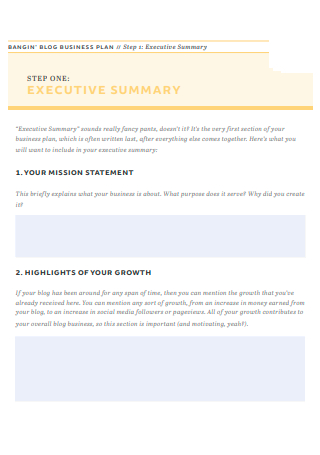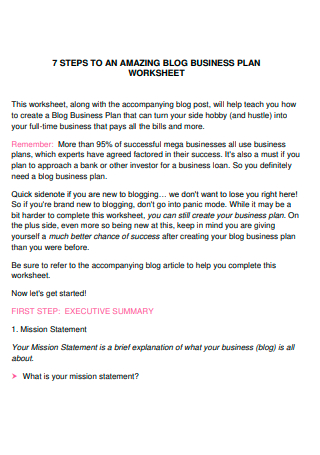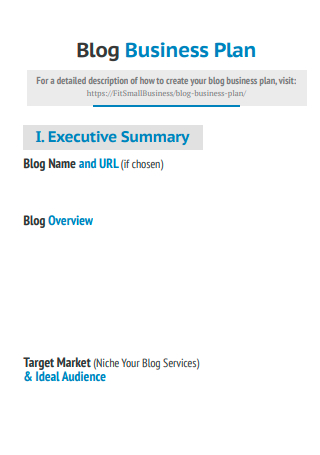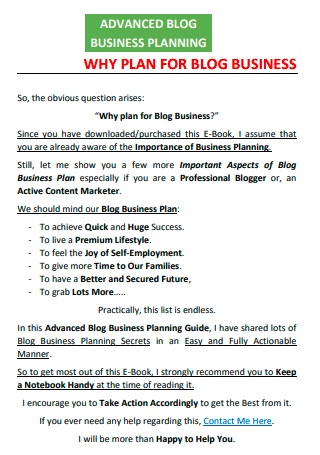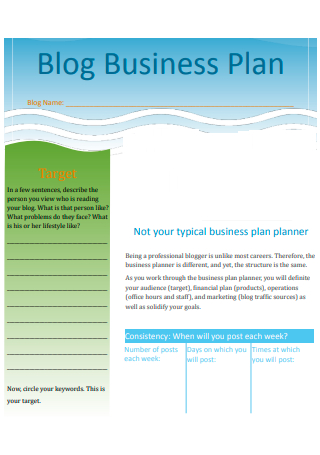4+ Sample Blog Business Plan
What Is a Blog Business Plan?
A blog business plan is a roadmap that explains why your blog exists, identifies your key objectives, and lays out a step-by-step approach to achieving those objectives. Your strategy will lead you through the most essential stages of your company’s development. Put your anxieties aside if you think writing a business plan for starting a blog will be difficult and confusing because this article will not only guide you through the process but will also showcase a blog business plan example so you will see for yourself a layout. Continue reading to learn more about it.
Different Types of Blogs
On the Internet, there are millions of active blogs, accounting for one-third of all websites. Blogs have grown to become powerful sources of information on practically any topic during the previous two decades. A blog can be used to inspire, educate, or connect with people. However, blogging isn’t solely for the benefit of your readers. It’s also for your benefit. There’s a lot of pleasure to be had from expressing yourself in new, digital ways. If you have not decided yet, try perusing through this list to see if one particular type fits you.
Reasons to Make a Blog
The original goal of blogs and blogging, comparable to an online journal, was for people to discuss their personal lives online. Blogging has developed over the last decade from a more personal to a more professional purpose. Instead of individuals writing simply for their friends and family, professionals began to write for the public to promote their brand and their business. In this article, we will look at the most common reasons why people start blogging, as well as the benefits of doing so.
How to Write a Blog Business Plan
Starting a blog business plan is more efficient than you think, while reading through this article, you are becoming more well-equipped with making your own. But you can’t write one that does not have the fundamental elements. This section of the article will guide you through the process in a simple manner. You won’t have to waste your time starting from scratch either because templates for a business plan for a blog are readily available.
Step 1: Create an Executive Summary
A business plan’s executive summary is often regarded as the most crucial piece. This part distills your business plan down to the essentials of how you propose to start and run a successful company. The major purpose of creating an executive summary as a blogger is to ensure that you are clear and focused on your goals. The name of your blog, a quick blog description, and summarized information about your blog’s target market and ideal readership should all be included in your executive summary. You should also include your blog’s mission statement and major business goals.
Step 2: Brand Identity Overview
Depending on where you are in your blog development process, the amount of detail you include in this area of your blog business plan will vary. If you’re just starting with your blog, you might not have figured out your full brand identity yet. A description of your brand’s personality, including what you want people to think of when they think of your blog’s brand and how your brand identity will represent your blog’s core beliefs and mission statement. Remember, a plan isn’t something you make and then forget about.
Step 3: Blog Content Overview
Your blog requires not only a general business plan but also a blog content strategy plan. Noting not just the sorts of content that will be published, but also how you plan to maintain the quality high. Make a list of the primary topic categories that your blog will cover. Two of the most common mistakes made by beginning bloggers are creating inconsistent material and developing blog posts that are irrelevant to the blog’s target audience. Consistency aids in the growth of your following as well as the authority of your brand. Creating content that is solely focused on the needs of your niche gives your viewers a trustworthy experience.
Step 4: Blog Marketing and Promotion Strategies
Another essential to your long-term success is to develop an excellent blog marketing and promotion strategy. While there are numerous strategies to advertise your blog, you should concentrate on the ones that will have the greatest impact, such as a strong launch plan, social media marketing, search engine optimization, and email marketing. You could also wish to investigate sponsored advertising if your budget permits it. This may or may not involve your launch strategy, but the launch time is the most difficult part of starting a new blog.
Step 5: Develop a Thorough Competitor Analysis
Getting a clear understanding of who your blog competitors are is crucial to your success. Thorough competition research is likely to disclose a plethora of opportunities that you wouldn’t have discovered otherwise. Pay attention to the site’s design, overall feel, usage of graphics and videos, and other things that have a positive or even negative impact on you. It’s sometimes the little things that add up to make a site stand out from the others. This is why it’s important to do your research on what works for others that can be applied to your blog, not to say you should copy them though. Put your unique twist on it.
Step 6: Blog Monetization Plan
You will need a solid money-making strategy if you want to transform your blog into a viable business. There are many ways to monetize a blog, though some produce better results than others. The best ways to make money blogging include affiliate marketing and selling digital products and services. Many bloggers list two different monetization strategies in their business plans. A “starter” monetization plan, followed by a “next-step” monetization plan that begins after blog traffic increases. Include the particular methods you intend to use. Set goals regarding when you will start each tactic as well as how much money you hope to generate from each method.
FAQs
What are the advantages of having a blog?
As you may be aware, blogging has aided many people and businesses over the last few years. Indeed, blogging didn’t exist nearly two decades ago. There are now millions of blogs on the internet all around the world. Even if making money online isn’t your primary goal, the blog can still be beneficial in a variety of ways. One of the benefits of blogging is that it helps you to create and manage your online identity; another benefit is that you learn new topics, and finally, your writing abilities develop.
What is a blog exit strategy?
Abandonment is the most common exit option for most blogs today. Since most bloggers do not regard their blogs as a company, this is the case. Instead, recognize the significance of pursuing your blog with a strategic business-building approach. That implies you have a wider range of options. When the time comes to move on, you have three options: abandon it, give it away, or sell it. If you plan to sell your blog at some point, now is the time to lay down the foundations of your money-making exit strategy.
Can a blog become a business?
Blogging is more than just a means for companies to advertise their goods and services. It can truly be the driving force behind a variety of businesses. There are several options if you want to establish your own blogging business, like becoming a freelance blogger, a ghost blogger, an affiliate marketer, an influencer, and so on.
Creating a blog business plan will be intimidating at first, but as you follow through with the guide this article has laid out for you, you would have completed your business plan before you even realize it. As a blog business planner, you would need to think ahead which is the most beneficial means of setting up your blog and proceeding through it as a business.

